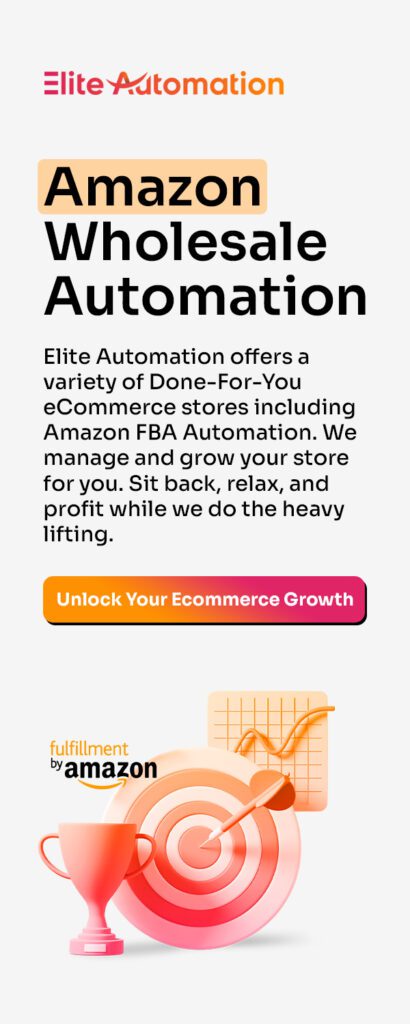As an Amazon seller, it’s natural to want to grow your eCommerce business & reach a wider audience. One way to do this is by expanding your sales channels beyond the Amazon platform. In this article, we’ll explore some strategies for expanding your business beyond Amazon, including selling on other online platforms and building your own website. We’ll also discuss the importance of building a brand & developing a marketing plan to support your growth efforts.

Why Expand Your Sales Channels?
There are several reasons why you might want to consider expanding your sales channels beyond Amazon. For one, it can help to diversify your income streams & reduce your reliance on a single platform. This can be especially important if you’re concerned about the potential risks of relying on Amazon, such as changes to their policies or an increase in competition.
Expanding your sales channels can also help you to reach a wider audience, as there are many consumers who prefer to shop on platforms other than Amazon. By tapping into these additional markets, you can potentially increase your customer base & boost your sales.
Finally, having a presence on multiple sales channels can also help to build your brand and establish your company as a reputable & trustworthy seller.
Selling on Other Online Platforms
One way to expand your business beyond Amazon is to sell your products on other online platforms. Some options to consider include:
eBay: This platform is popular for selling a wide range of products, including new and used items. While the fees for selling on eBay can be slightly higher than those on Amazon, it can be a good option if you have unique or hard-to-find products that may not be as competitive on Amazon.
Etsy: This platform is geared towards handmade, vintage, & craft items. If you sell products that fall into these categories, Etsy can be a great place to reach a dedicated audience of shoppers interested in unique & artisanal products. Keep in mind when selling in most categories on Etsy, you will incur a $0.20 listing fee per product listed.
Walmart: This platform is a good option for sellers looking to reach a large audience of consumers. While the fees for selling on Walmart are around the same as Amazon, there can be much less competition.
Other specialty sites: There are many online platforms that cater to specific niches or product categories. For example, if you sell health & wellness products, you might consider selling on a platform like Thrive Market.

Building Your Own Website or eCommerce Storefront
Another way to expand your business beyond Amazon is to build your own website. This can be a good option if you want to have more control over the customer experience, as you’ll be able to design & customize your site to meet your specific needs. We highly recommend Shopify for eCommerce sellers as it offers seamless app integrations, free (and paid) plug-ins to help with conversions, & an easy setup process.
There are a few key steps to building a successful website for your business:
Choose a domain name: This is the URL that people will use to access your website. It’s important to choose a domain name that is easy to remember & reflects your brand.
Choose a website builder: There are many tools available for building a website, ranging from simple drag-and-drop builders to more advanced options for those with coding experience. Some popular options include Wix, Squarespace, & Shopify.
Design and customize your site: Use your website builder’s tools to create a professional-looking website that reflects your brand and showcases your products. Make sure to include high-quality images, clear product descriptions, & easy-to-use navigation.
Set up e-commerce functionality: If you want to sell your products directly through your website, you’ll need to set up e-commerce functionality. This typically involves choosing a payment processor (such as PayPal or Stripe), setting up shipping & tax options, and integrating your website with any inventory or order management systems you may be using.
Now You Can Promote your eCommerce Website
Once your website or eCom storefront is up & running, it’s important to promote it in order to attract visitors and potential customers. Some strategies you can use include:
SEO: Optimizing your website for search engines can help to increase its visibility in search results & drive traffic to your site. This involves using keywords in your website’s content, optimizing your site’s structure and layout, and building high-quality backlinks.
Social media: Utilizing social media platforms like Facebook, TikTok, Instagram, and Twitter can be a great way to promote your website & engage with potential customers.
Email marketing: Building an email list & sending regular e-mail newsletters or promotional emails can be an effective way to keep your business top-of-mind with potential customers and drive traffic to your website.

Building a Brand and Developing a Marketing Plan
In addition to expanding your sales channels, it’s important to focus on building a strong brand and developing a marketing plan to support your growth efforts.
Building a brand involves creating a cohesive identity for your business, including your logo, color scheme, and messaging. It also involves developing a clear brand message & positioning your products in a way that resonates with your target audience.
Having a well-defined brand can help to differentiate your business from competitors and build customer loyalty.
A marketing plan is a document that outlines the strategies & tactics you’ll use to promote your business and reach your target audience. This can include tactics such as social media marketing, email marketing, content marketing, and advertising.
Developing a marketing plan can help you to focus your efforts, track your progress, and measure the success of your marketing efforts.
Our Final Summary
Expanding your sales channels beyond Amazon can be a great way to grow your business & reach a wider audience. Options for doing so include selling on other online platforms and building your own website.
In addition to expanding your sales channels, it’s important to focus on building a strong brand & developing a marketing plan to support your growth efforts. By following our recommended strategies, you can position your business for success & take your eCommerce venture to the next level on and off of Amazon.
To get started with an automated eCommerce store, contact us here at Elite Automation.

